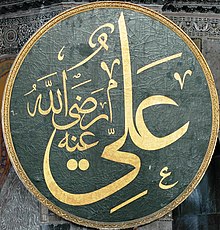
Ali
4th Rashidun caliph from 656 to 661 and 1st Shia imam / From Wikipedia, the free encyclopedia
Dear Wikiwand AI, let's keep it short by simply answering these key questions:
Can you list the top facts and stats about Ali?
Summarize this article for a 10 year old
Ali ibn Abi Talib (Arabic: عَلِيُّ بْن أَبِي طَالِب, romanized: ʿAlī ibn Abī Ṭālib; c. 600–661) was the cousin and son-in-law of the Islamic prophet Muhammad, and was the fourth Rashidun caliph who ruled from 656 to 661, as well as the first Shia imam. Born to Abu Talib ibn Abd al-Muttalib and Fatima bint Asad, a young Ali was raised by his elder cousin Muhammad and was among the first to accept his teachings.
| Ali عَلِيّ | |
|---|---|
 Calligraphic panel bearing Ali's name at the Hagia Sophia | |
| 4th Caliph of the Rashidun Caliphate | |
| Reign | 17 June 656 – 28 January 661 |
| Predecessor | Uthman ibn Affan |
| Successor | Abolished position Hasan ibn Ali (as caliph) |
| 1st Shia Imam | |
| Tenure | 8 June 632 – 28 January 661 |
| Predecessor | Established position |
| Successor | Hasan ibn Ali |
| Born | c. 600 CE Mecca, Hejaz, Arabia |
| Died | c. 28 January 661 CE (c. 21 Ramadan 40 AH) (aged c. 60) Kufa, Rashidun Caliphate |
| Burial | |
| Spouse |
|
| Issue | |
| Tribe | Quraysh (Banu Hashim) |
| Father | Abu Talib ibn Abd al-Muttalib |
| Mother | Fatima bint Asad |
| Religion | Islam |
Ali played a pivotal role in the early years of Islam when Muslims were severely persecuted in Mecca. After immigration (hijra) to Medina in 622, Muhammad gave his daughter Fatima to Ali in marriage and swore a pact of brotherhood with him. Ali served as Muhammad's secretary and deputy in this period, and was the flag bearer of his army. Numerous sayings of Muhammad praise Ali, the most controversial of which was uttered in 632 at the Ghadir Khumm, "Whoever I am his mawla, this Ali is his mawla." The interpretation of the polysemous Arabic word mawla is disputed: For Shia Muslims, Muhammad thus invested Ali with his religious and political authority, while Sunni Muslims view this as a mere statement of friendship and rapport. When Muhammad died in the same year, a group of Muslims met in the absence of Ali and appointed Abu Bakr (r. 632–634) as their leader. Ali later relinquished his claims to leadership and resigned from public life during the reigns of Abu Bakr and his successor, Umar (r. 634–644). Even though his advice was occasionally sought, the conflicts between Ali and the first two caliphs are epitomized by his refusal to follow their practices. This refusal cost Ali the caliphate to the benefit of Uthman (r. 644–656), who was thus appointed to succeed Umar by the electoral council. Ali was also highly critical of Uthman, who was widely accused of nepotism and corruption. Yet Ali also repeatedly mediated between the caliph and the provincial dissidents angered by his policies.
Following Uthman's assassination in June 656, Ali was elected caliph in Medina. He immediately faced two separate rebellions, both ostensibly to avenge Uthman: The triumvirate of Talha, Zubayr, both companions of Muhammad, and his widow Aisha captured Basra in Iraq but were defeated by Ali in the Battle of the Camel in 656. Elsewhere, Mu'awiya, whom Ali had just removed from the governorship of Syria, fought against Ali the inconclusive Battle of Siffin in 657, which ended in a failed arbitration process that alienated some of Ali's supporters. These formed the Kharijites, who later terrorized the public and were crushed by Ali in the Battle of Nahrawan in 658. Ali was assassinated in 661 by the Kharijite dissident Ibn Muljam, which paved the way for Mu'awiya to seize power and found the dynastic Umayyad Caliphate.
Ali is revered for his courage, honesty, unbending devotion to Islam, magnanimity, and equal treatment of all Muslims. For his admirers, he has thus become the archetype of uncorrupted Islam and pre-Islamic chivalry. Sunni Muslims regard him as the last of the rashidun (lit. 'rightly-guided') caliphs, while Shia Muslims venerate him as their first imam, that is, the rightful religious and political successor to Muhammad. Ali's place is said to be second only to Muhammad in Shia Muslim culture. The shrine of Ali in Najaf, Iraq, is a major destination for Shia pilgrimage. The legacy of Ali is collected and studied in numerous books, the most famous of which is Nahj al-balagha.